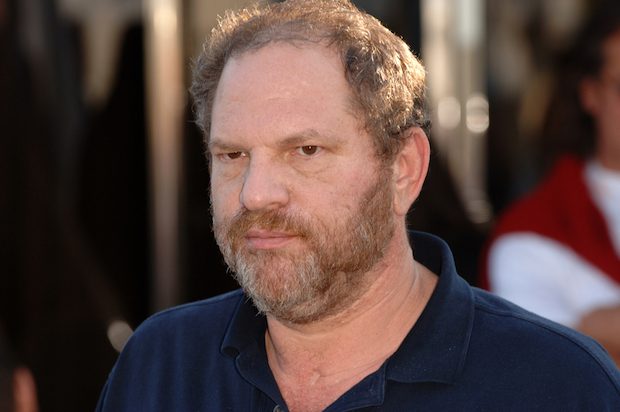René Girard & Harvey Weinstein

The piggish Harvey Weinstein really has been destroyed professionally. Good:
Hollywood’s de facto governing body, the Academy of Motion Picture Arts and Sciences, voted overwhelmingly on Saturday to “immediately expel” Harvey Weinstein, breaking with 90 years of precedent and turning one of the biggest Oscar players in history into a hall-of-fame pariah.
The academy’s 54-member board of governors made the decision at an emergency session after investigations by The New York Times and The New Yorker that revealed sexual harassment and rape allegations against him going back decades.
In a statement, the academy said the vote was “well in excess of the required two-thirds majority.”
It added, “We do so not simply to separate ourselves from someone who does not merit the respect of his colleagues but also to send a message that the era of willful ignorance and shameful complicity in sexually predatory behavior and workplace harassment in our industry is over. What’s at issue here is a deeply troubling problem that has no place in our society.”
Well, we shall see if that era really is over in Hollywood. I can’t watch this annihilation of Harvey Weinstein without thinking of René Girard’s theory of the scapegoat mechanism:
Whereas the philosophers of the 18th century would have agreed that communal violence comes to an end due to a social contract, Girard believes that, paradoxically, the problem of violence is frequently solved with a lesser dose of violence. When mimetic rivalries accumulate, tensions grow ever greater. But, that tension eventually reaches a paroxysm. When violence is at the point of threatening the existence of the community, very frequently a bizarre psychosocial mechanism arises: communal violence is all of the sudden projected upon a single individual. Thus, people that were formerly struggling, now unite efforts against someone chosen as a scapegoat. Former enemies now become friends, as they communally participate in the execution of violence against a specified enemy.
Girard calls this process ‘scapegoating’, an allusion to the ancient religious ritual where communal sins were metaphorically imposed upon a he-goat, and this beast was eventually abandoned in the desert, or sacrificed to the gods (in the Hebrew Bible, this is especially prescribed in Leviticus 16).The person that receives the communal violence is a ‘scapegoat’ in this sense: her death or expulsion is useful as a regeneration of communal peace and restoration of relationships.
However, Girard considers it crucial that this process be unconscious in order to work. The victim must never be recognized as an innocent scapegoat (indeed, Girard considers that, prior to the rise of Christianity, ‘innocent scapegoat’ was virtually an oxymoron; see section 4.b below); rather, the victim must be thought of as a monstrous creature that transgressed some prohibition and deserved to be punished. In such a manner, the community deceives itself into believing that the victim is the culprit of the communal crisis, and that the elimination of the victim will eventually restore peace.
The thing is, Harvey Weinstein really is guilty of monstrous transgressions. But in Girardian terms, the point is that everyone believes that he is. More:
According to Girard, the scapegoat mechanism brings about unexpected peace. But, this moment is so marvelous, that it soon acquires a religious overtone. Thus, the victim is immediately consecrated. Girard is in the French sociological tradition of Durkheim, who considered that religion essentially accomplishes the function of social integration. In Girard’s view, inasmuch as the deceased victim brings forth communal peace and restores social order and integration, she becomes sacred.
At first, while living, victims are considered to be monstrous transgressors that deserve to be punished. But, once they die, they bring peace to the community. Then, they are not monsters any longer, but rather gods. Girard highlights that, in most primitive societies, there is a deep ambivalence towards deities: they hold high virtues, but they are also capable of performing some very monstrous deeds. That is how, according to Girard, primitive gods are sanctified victims.
I don’t know how this Girardian process might work out in Weinstein’s case. I mean, I don’t know what it would look like if it worked according to Girard’s script.
What concerns me is that the Hollywood community will allow itself to believe that having “executed” Harvey Weinstein, metaphorically, it will have purged itself of its own sins of sexual exploitation and brutality. It is a deeply human instinct to believe that a sacrificial victim bears the sins of the collective. What is happening to Harvey Weinstein is just, no question, but it will be deeply unjust if Hollywood’s moral reckoning ends with Harvey Weinstein.
The next few weeks will tell us whether or not Harvey Weinstein will have been a Girardian scapegoat, or something else. I’m betting that the people of the Dream Factory, so talented at creating illusions, will work hard to find a way to make this thing end with Harvey, to isolate the infection to him. I hope I’m wrong.
Subscribe for as little as $5/mo to start commenting on Rod’s blog.